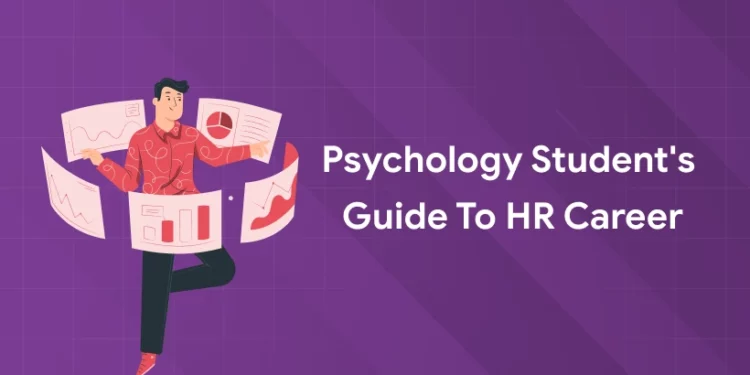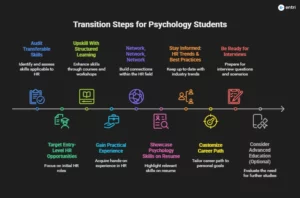Table of Contents
Key Takeaways:
- Psychology students have a natural advantage in HR careers because their understanding of human behavior helps them connect deeply with people and workplace dynamics.
- HR roles are diverse, offering opportunities in recruitment, employee engagement, conflict resolution, learning and development, and data-driven decision-making.
- Transitioning from psychology to HR involves building on existing soft skills, gaining practical HR knowledge, and developing business understanding.
- Networking, ongoing learning, and hands-on experience through internships or volunteering are critical for entering and thriving in HR roles.
- HR is evolving into a strategic, people-focused function where empathy, ethical judgment, and adaptability are just as important as traditional HR management skills.
Introduction: Why Psychology Students Shine in HR
Many psychology students set out with dreams of helping people—whether it’s running a private clinic, working in counseling, or improving the well-being of those in crisis. But as real-world workplaces evolve, more graduates are realizing their drive to impact lives can take shape in surprising and deeply rewarding ways: by guiding company culture, boosting employee happiness, and shaping the success of entire organizations through Human Resources. This journey isn’t always linear—some discover their passion for HR after trying clinical practice, while others are drawn by the excitement of working at the heart of a diverse, fast-paced company.
What makes psychology students so well-suited for HR? It’s the innate curiosity about what motivates people, the skill for navigating both group dynamics and individual needs, and a belief that every person deserves a supportive environment to thrive. Roles in HR call for empathy, diplomacy, and intuition—traits that are nurtured through psychology studies and real-world experiences. As those who’ve successfully made the career switch attest, the most impactful HR professionals are those who blend analytical thinking with compassion and adaptability—turning workplaces into communities where people—and companies—can flourish.
Secure your career in HR Management with Entri. Enrol now!!
What Makes Psychology Relevant to HR?
Human resources is as much about people as it is about processes. Here’s how a psychology degree fits perfectly:
The People-Centric Nature of HR
-
HR professionals act as the bridge between management objectives and employee well-being—requiring insight into motivation, personality, and group behavior.
-
A background in psychology enhances a practitioner’s ability to manage sensitive conversations, resolve conflict, and foster inclusivity—a must for modern workplaces.
-
With the rise of mental health initiatives, psychological safety, and positive workplace culture, psychology knowledge is now more prized than ever in HR teams.
Pro Tip: Leverage your psychology coursework—such as counseling, behavioral analysis, and personality assessment—to design more holistic HR policies and wellness programs.
Where Psychology Graduates Excel in HR
-
Recruitment and Talent Acquisition: Accurately evaluating candidate fit and potential using behavioral insights.
-
Employee Relations: Addressing grievances, managing disputes, and deploying conflict resolution techniques.
-
Employee Engagement: Boosting productivity, motivation, and loyalty through psychological motivators and programs.
-
Organizational Development: Implementing change management and diversity, equity, and inclusion (DEI) initiatives with scientific backing.
Become an HR Expert – Enroll in Our HR Management Course Today!
Unlock the secrets to effective Human Resource Management with our expert-led course! Learn recruitment, employee relations, performance management, and more to build a thriving workplace. Start your journey toward a successful HR career today!
Know MoreTypical HR Career Paths for Psychology Graduates
Mapping your journey from psychology to HR involves choosing roles that suit your interests and leveraging your soft skills to climb the HR ladder.
-
HR Generalist: The all-rounder, covering everything from recruitment to employee exits.
-
Recruitment/Talent Acquisition Specialist: Focusing on attracting top talent and creating an inclusive hiring process.
-
Employee Relations or Engagement Manager: Handling workforce satisfaction, resolving conflicts, and promoting a positive work environment.
-
Learning & Development Coordinator: Designing and delivering training, e-learning, and leadership programs.
-
HR Data Analyst: Using psychology and analytics to inform decision-making, improve retention, and enhance productivity.
Each of these paths offers growing responsibility, strong career security, and the opportunity to positively impact both people and business performance.
Explore our free materials, which can build a strong HR foundation!
| Career Path | Typical Job Titles | Core Responsibilities | Essential Skills |
|---|---|---|---|
| HR Assistant / Coordinator | HR Assistant, HR Coordinator | Supporting HR operations, maintaining records, scheduling interviews | Organization, communication |
| HR Generalist | HR Generalist, People & Culture Generalist | Broad HR functions (recruitment, onboarding, payroll, compliance) | Multi-tasking, problem-solving |
| Recruitment Specialist | Recruiter, Talent Acquisition Specialist | Sourcing, screening, interviewing, onboarding candidates | Interviewing, assessment |
| Employee Relations | Employee Relations Manager, Engagement Officer | Handling conflicts, grievance resolution, fostering workplace harmony | Mediation, empathy |
| Learning & Development | Training Coordinator, L&D Specialist | Designing/delivering employee training, growth planning | Presentation, coaching |
| HR Analyst | HR Data Analyst, HRIS Specialist | Workforce analytics, HR system management, performance analysis | Data analysis, tech-savvy |
| Payroll & Compliance | Payroll Officer, HR Compliance Coordinator | Managing payroll, ensuring legal compliance, reporting | Attention to detail, integrity |
| HR Manager / Business Partner | HR Manager, HRBP, People Manager | Overseeing HR strategy, policy, team management | Leadership, strategic thinking |
| Senior HR/Director | Senior HR Manager, Head of HR, Chief People Officer | Leading HR teams, setting people strategy, executive decision-making | Executive skills, vision |
How to Transition: Steps for Psychology Students
-
Audit Your Transferable Skills
-
List experiences from psychology coursework, internships, or volunteer roles that highlight communication, empathy, conflict resolution, research, or teamwork.
-
These soft skills are prized in HR and will make your resume more compelling.
-
-
Target Entry-Level HR Opportunities
-
Roles like HR Assistant, Recruitment Coordinator, or HR Admin are common stepping stones.
-
Focus your job search on organizations open to non-traditional backgrounds and emphasize your people-centric skills.
-
-
Upskill With Structured Learning
-
Complete an HR-specific certification or diploma. Entri’s HR Management Course in Kerala is ideal for gaining practical HR skills, industry knowledge, and placement support, with modules tailored for freshers.
-
Consider additional certifications such as SHRM-CP, CIPD, or a postgraduate HR diploma for further credibility.
-
-
Gain Practical Experience
-
Internships, HR-related volunteer work, or even taking on leadership roles in student organizations add real-world experience.
-
Many companies welcome psychology grads as HR interns due to their insight into motivation and group behavior.
-
-
Network, Network, Network
-
Join HR associations or LinkedIn groups. Attend industry webinars or local seminars. Tap into your university’s alumni.
-
Make the most of Entri’s placement support, mock interviews, and resume workshops for inside guidance and hidden job opportunities.
-
-
Showcase Psychology Skills on Your Resume
-
Clearly position psychology-based achievements—such as behavioral analysis, understanding of motivation theory, or experience in counseling/problem solving—as valuable to HR.
-
Use strong action verbs and quantify impact wherever possible.
-
-
Stay Informed: HR Trends & Best Practices
-
Read HR blogs, follow industry leaders, and subscribe to HR newsletters to learn about topics like workplace mental health, DEI, employee engagement, and HR analytics.
-
-
Customize Your Career Path
-
Explore various HR verticals (recruiting, learning and development, compensation and benefits, employee engagement) and visualize a career map.
-
Plan for continuous learning: the most successful HR professionals often climb from generalist to specialist to manager, earning advanced qualifications or higher degrees along the way.
-
-
Be Ready for Interviews
-
Entri’s HR Management Course provides mock interviews and practical assignments; use these to strengthen your interview confidence and learn industry jargon.
-
Prepare answers illustrating how your psychology background equips you to understand people, solve workplace issues, and drive engagement.
-
-
Consider Advanced Education (Optional)
-
-
If aiming for senior HR roles or consulting, a Master’s in HRM or organizational psychology, especially those with professional affiliations such as CIPD, can be a major advantage.
-
However, it’s possible to start as an HR professional with only a bachelor’s—in combination with targeted training and on-the-job learning.
-
Pro Tip: Be persistent! HR values diverse backgrounds and psychological insight. Your unique experience is your strength.
Integrating these expanded steps makes the career switch journey actionable and clear for every psychology student ready for HR.
Key Skills HR Employers Want in 2025
Employers today are searching for HR professionals who can blend people skills with critical thinking and digital acumen. Here’s what stands out:
-
Recruitment & Onboarding Expertise: Managing full hiring cycles and candidate experiences.
-
Payroll and Compliance Knowledge: Understanding statutory and legal HR requirements.
-
Data-driven Decision-making: Using HR analytics and technology tools for workforce management.
-
Remote Team Leadership: Building and managing geographically distributed teams.
-
Empathy and Ethics: Maintaining integrity, diversity, and a human touch—areas where psychology students particularly excel.
-
Continuous Learning: Keeping updated with trends, tools, and changing workplace norms.
Become an HR Expert – Enroll in Our HR Management Course Today!
Unlock the secrets to effective Human Resource Management with our expert-led course! Learn recruitment, employee relations, performance management, and more to build a thriving workplace. Start your journey toward a successful HR career today!
Know MoreEntri’s HR Management Course: A Gamechanger
Why Choose Entri for HR Management?
-
Comprehensive Curriculum: Covers recruitment, payroll, analytics, labor law, and soft skills.
-
Flexible Learning: Live interactive sessions, recorded video classes, and practical assignments.
-
Placement Support: Dedicated job portal, resume building, and interview prep ensure career launchpad.
-
Mentorship & Community: Access to industry experts and alumni, building valuable contacts for freshers and career changers alike.
What Makes Entri Stand Out?
-
100% placement assistance and real-world HR simulation projects.
-
Endorsements from industry practitioners and successful alumni.
-
Courses are beginner-friendly and open to all educational backgrounds—ideal for psychology graduates making their first foray into HR.
Conclusion: Start Your Journey—Shape Workplaces, Shape Futures
In the evolving work landscape, psychology students are uniquely qualified to drive people-centered change—in hiring, engagement, and organizational culture. By supplementing your foundational skills with dynamic HR training like Entri’s HR Management Course, you open the door to a flexible, impactful, and rewarding profession. Enrol today and take the first step towards building workplaces where every individual can thrive.
|
Related Articles |
||
| Best Career Options After BA | Skills Required for HR Professionals | |
| Will AI Replace HR Jobs? | ||
| Human Resource Management (Ultimate Guide) | ||
Become an HR Expert – Enroll in Our HR Management Course Today!
Unlock the secrets to effective Human Resource Management with our expert-led course! Learn recruitment, employee relations, performance management, and more to build a thriving workplace. Start your journey toward a successful HR career today!
Know MoreFrequently Asked Questions
Can a psychology degree get you into HR?
Absolutely. Psychology students have an edge in HR—especially in hiring, mediation, employee engagement, and wellness programs. Practical HR credentials close any gaps.
Do I need an MBA in HR or a specialized degree to get started?
Not required for entry-level roles, but upskilling with a recognized HR certification such as Entri’s is highly recommended for confidence and credibility.
What are the growth paths for psychology graduates in HR?
Start as an HR Assistant or Recruiter. Progress to HR Business Partner, Engagement Lead, Training Manager, or even Chief Human Resources Officer depending on skills and ambition.
How do I showcase my psychology experience on my HR resume?
Highlight psychology courses, communication, decision-making, and experience in counseling, mentoring, or leadership in campus activities.
What’s the role of certifications in HR hiring today?
Over 70% of Indian HR recruiters prefer or require industry certifications—especially for non-MBA or non-commerce backgrounds like psychology. Entri’s certification boosts hireability.















